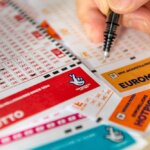Lottery odds are the probabilities of winning a prize in a lottery, which directly correlate to the design of the lottery game itself. These odds are determined by several factors, including the total number of possible number combinations, the number of winning numbers drawn, and the specific rules of the game, such as whether the order of numbers matters. Understanding lottery odds is crucial for players because it provides insight into their chances of winning and can inform their decisions on whether to play and how to choose their numbers.
Different lottery games offer varying odds of winning due to their unique structures. For instance, a typical 6/49 lotto game, where players choose six numbers from a pool of 49, offers different odds compared to a larger game like a 7/50 format. Moreover, lotteries may also have secondary prizes for matching a subset of the winning numbers, which have different odds of being won compared to the jackpot.
Lotteries often utilise large jackpots to attract players, yet the substantial prizes are reflective of the long odds against winning them. The astronomical odds do not deter millions from playing, suggesting that the entertainment value or the dream of a life-changing windfall outweighs the improbability of a major win for many participants. Indeed, the slim chance of hitting the jackpot is a core component of the allure of lottery games.
Understanding Lotteries
Lotteries are a form of gambling that involve the drawing of numbers for a prize. They are regulated by governments to various degrees, and their mechanics and implications are influenced by both chance and strategy.
Definitions and Concepts
Lotteries are based on a simple concept: participants buy tickets for a chance to win a prize, typically in the form of money. When a ticket is purchased, it is often assigned a unique set of numbers or a combination, which is later compared against numbers drawn randomly by the lottery organisers. The odds of winning a lottery are determined by several factors, including the number of possible number combinations and the number of tickets sold.
- Fixed Prize: Fixed prizes are awarded regardless of how many tickets are sold. They do not change and are known in advance.
- Progressive Jackpot: This prize increases every time the lottery is drawn without a winner.
- Odds of Winning: The likelihood of a ticket matching all the winning numbers. This is typically quite low.
Common terms used in association with lotteries include:
- Draw: The process of selecting the winning numbers.
- Jackpot: The largest prize offered in a lottery.
- Rollover: When no one wins the jackpot and the prize money is carried over to the next draw, it increases the future jackpot.
History of Lotteries
Historically, lotteries have been used to raise funds for both private and public ventures. In early European history, lotteries were held for entertainment during dinner parties. Participants would receive a ticket, and prizes would often consist of fancy items such as dinnerware.
The first recorded state-sponsored lottery in England was sanctioned by King James I in 1612 to provide funds for the settlement of Jamestown, Virginia, the first permanent British colony in America. Since then, governments and licensed operators have conducted lotteries with various degrees of success and regulation..ApplyResources
Basic Lottery Odds
Understanding the mathematics behind lottery odds is crucial for anyone interested in the game. These odds are determined by several fixed probability principles, and a number of misconceptions surround them.
Probability Principles
Lottery odds are calculated based on the number of possible combinations of numbers that can be drawn. For a typical lottery, where one must select 6 numbers from a pool of 49, the formula used is the combination formula, which is represented as nCr = n! / r!(n – r)!, where n is the total number of available numbers and r is the number of numbers chosen. Here, the probability of winning the jackpot is 1 in 13,983,816. This is determined by the calculation 49C6, simplifying to 49! / 6!(49-6)!.
Calculating Lottery Odds:
- Total Possible Combinations (Jackpot Odds): 49C6 = 49! / 6!(43!) = 1 in 13,983,816
- Odds of Selecting One Correct Number: 49C1 = 49 = 1 in 49
- Odds of Selecting Five Correct Numbers: 49C5 = 49! / 5!(44!) = 1 in 1,906,884
The lottery is a popular form of gambling that engages millions of participants who hope to win large sums of money. Typically run by state or national governments, these games involve selecting a series of numbers that, if matched with the numbers drawn, can result in significant monetary wins. Lottery formats vary widely, but often include draw-based games which are played by purchasing a ticket with a set of numbers, as well as instant-win scratch cards that reveal results immediately.
With the potential for life-changing prizes, the lottery generates a wide array of questions from participants eager to understand the rules, increase their chances of winning, or navigate the claiming process. From odds of winning to the allocation of funds raised through ticket sales, lotteries are complex systems that operate under strict regulations. These regulations protect players and ensure fairness and transparency in the games.
In response to common queries, lottery organisers provide extensive information and resources. These help players to participate responsibly, while educating them about the prize structure, the randomness of the draw, and what to do in the event of securing a win. Although the chance of claiming a top prize is often slim, the lottery remains an enduring element of popular culture, symbolising the dream of a rags-to-riches transformation through sheer luck.
Understanding Lotto
This section provides an insightful overview of Lotto, detailing its nature, mechanics, and the probability of winning this popular form of gambling.
What Is Lotto?
Lotto is a form of gambling where players choose numbers to match those drawn by a lottery commission. It is a game of chance that offers monetary rewards to participants who successfully predict a set number of winning numbers. Different from other forms of gambling, Lotto is often operated by state or national governments.
How Does Lotto Work?
To participate in Lotto, individuals purchase tickets which contain a set of numbers they have selected or that have been randomly assigned by the lottery system. Lotto draws are conducted at scheduled times, typically weekly, where a machine randomly selects a combination of winning numbers.
Process of a Lotto Draw:
- Purchase a ticket with chosen or random numbers.
- Await the official draw.
- Verify if the numbers on the ticket match the drawn numbers.
The Odds of Winning
The probability of winning the Lotto depends on several factors, including the number of possible number combinations and the number of winning numbers required. The odds are typically expressed as a ratio.
| Matched Numbers | Typical Odds |
|---|---|
| 6 of 6 | 1 in 45,057,474 |
| 5 of 6 | 1 in 1,033,396 |
| 4 of 6 | 1 in 55,492 |
Odds vary by lottery and are approximate.
Playing The Lotto
Participating in the Lotto involves buying tickets, selecting numbers, and being aware of draw schedules. This section provides essential details on each aspect.
How to Buy Lotto Tickets
Tickets can be purchased in-person at authorised retailers or online through official lottery websites or apps. To buy a ticket, one must be at least 16 years old in the UK. Payment methods vary, but typically include cash, debit cards, and direct bank transfers.
Choosing Your Numbers
Players can pick their numbers manually or opt for a Random Number Generator (RNG), commonly referred to as a ‘Lucky Dip’. Most lotteries allow a selection of main numbers plus additional numbers, such as a ‘Bonus Ball’. The number of selections varies per game.
Lotto Draw Days and Times
Draws typically occur on scheduled days. For example, the UK National Lottery has draws on Wednesdays at 20:30 and Saturdays at 19:45. EuroMillions draws take place on Tuesdays and Fridays at 20:45 Central European Time.\Mapping of games to their draw days and times ensures players do not miss their chance to participate.
Prizes and Claims
When playing the Lotto, participants can win various types of prizes, which they must claim within a specific timeframe following clear procedures.
Types of Lotto Prizes
Lotto prizes typically fall into multiple tiers based on the number of matching numbers. The top prize, or jackpot, is awarded for matching all six numbers drawn. Other prize tiers may include smaller monetary amounts for matching fewer numbers, often with a bonus ball to increase secondary prize categories. For example:
- Match 6 numbers: Jackpot
- Match 5 numbers + Bonus Ball: Second tier prize
- Match 5 numbers: Third tier prize, and so on.
How to Claim Winnings
The claiming process for Lotto winnings depends on the prize amount and where the ticket was purchased.
- Prizes up to £500: Claimed at any authorised retailer.
- Prizes from £501 to £50,000: Claimed at designated post offices or by mail.
- Prizes over £50,000: Must be claimed in person at the Lotto headquarters.
Winners should sign the back of their ticket and provide a valid ID during the claim.
Deadline for Prize Claims
All Lotto prizes have a deadline for claims, typically 180 days from the draw date, after which unclaimed prizes are directed towards charitable causes. Winners must adhere to the following deadlines:
- Direct purchase tickets: 180 days from the draw date.
- Online purchases: Automatically credited for amounts up to £2,000; for larger sums, you must complete an online claim form before the deadline.
If the claim deadline falls on a public holiday, the deadline extends to the next working day.
Lotto Variations
Lotto, a popular form of gambling, offers numerous game types and special draws, with opportunities extending internationally.
Different Lotto Games
Lotto games vary significantly in format and rules. For instance, EuroMillions uses 5 numbers and 2 Lucky Stars, while the UK National Lottery requires 6 number selections from a smaller pool. Powerball in the US features a separate pool for the ‘Powerball’ number, which is essential for the jackpot.
Special Lotto Draws
Occasionally, lotteries organise special draws with enhanced prizes or odds. The UK National Lottery, for example, holds occasional Must Be Won draws where if no one wins outright, the jackpot rolls down to lower prize tiers. In EuroMillions, Super Draws or Event Draws offer guaranteed large jackpots, regardless of the previous draw’s outcome.
International Lotto Opportunities
Players often have the chance to participate in lotteries outside their home country. Online platforms enable entries into games like US Mega Millions or Italian SuperEnalotto, broadening the scope of potential winnings. These platforms act as intermediaries, purchasing tickets in the player’s name.
Responsible Gaming
Responsible gaming ensures the activity remains a fun and entertaining experience while minimising potential harm.
Understanding the Risks
It is vital for players to recognise the inherent risks of gambling. The chances of winning big jackpots are typically low and gambling should never be seen as a reliable source of income.
Setting Limits
Players are advised to set clear limits before participating in any form of gambling. This includes:
- Time limits for playing
- Monetary limits on wagers
- Fixed loss thresholds
To assist with this, many lotteries provide tools and features to set these restrictions within their services.
Getting Help for Problem Gambling
For individuals struggling with gambling issues, support is available from a range of organisations. They can provide:
- Counselling services
- Support groups
- Such as Gamblers Anonymous
- Helplines
- For example, the National Gambling Helpline
If gambling is affecting someone’s life negatively, they should seek assistance immediately.
Frequently Asked Questions
In this section, readers will find answers to common queries regarding Lotto play, prize claims, taxation, and jackpot calculations.
Can I Play Lotto Online?
One can indeed play Lotto online through authorised websites and mobile apps. These platforms require registration and are subject to regional availability.
What Happens to Unclaimed Prizes?
Unclaimed Lotto prizes are typically allocated to various causes after the claim period expires, which is generally 180 days from the draw date.
Are Lotto Winnings Taxed?
In the UK, Lotto winnings are not taxed as income. However, large sums may be subject to inheritance tax if passed on to others.
How Are Jackpots Calculated?
Lotto jackpots are calculated based on ticket sales and the number of winners. If no one wins, the jackpot rolls over to the next draw, usually increasing significantly.





